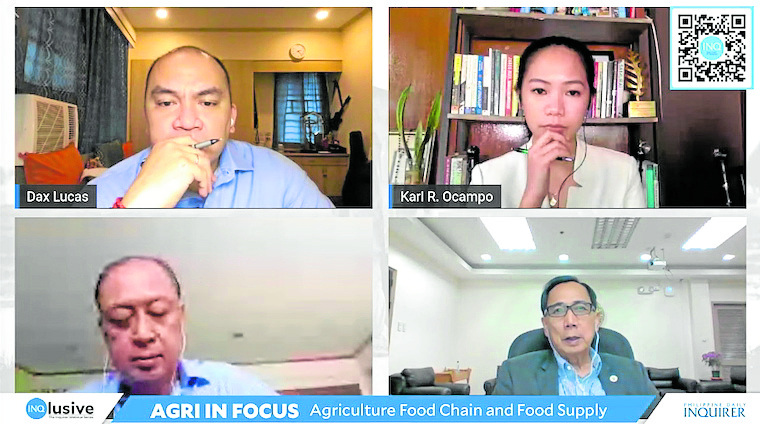
CRISIS AND OPPORTUNITY Moderators and panelists on the Inquirer “webinar” on agriculture held on Wednesday tackle the challenges facing the sector after almost three months of lockdown to help contain the spread of the coronavirus. Clockwise, top left: Inquirer Prime content and Business writing editor Daxim Lucas, Inquirer reporter Karl Ocampo, Agriculture Secretary William Dar and United Broilers Raisers’ Association president Elias “Bong” Inciong.
The Department of Agriculture (DA) has crafted a “survival” framework to help the sector recover from the impact of the new coronavirus disease (COVID-19) pandemic which led agricultural prices dropping and farmers reducing production.
Following the government’s lockdown of several parts of the country since March in its effort to contain the spread of COVID-19, the gaps in the farm sector have been magnified amid unloaded produce and the indefinite cold storage of meat and other products.
Government’s visionAgriculture Secretary William Dar presented the government’s framework at the Inquirer’s webinar on Thursday titled “Agri in Focus: Agriculture Food Chain and Food Supply,” as he explained the need for the sector to adapt and be resilient.
“The vision now is to be a food-secure and resilient country with prosperous farmers and fisherfolk,” Dar said. “For our survival and recovery, we need to look at three stages: survive, reboot and grow.”
“[But] we are [currently] in the survival stage and until we win against this pandemic, then we will remain in this stage probably for the next six months,” he said.
The agriculture chief said this is an opportunity to “increase food sufficiency level in all commodities” by improving domestic production and by importing food requirements that the country cannot sustainably produce.
Copanelist Elias “Bong” Inciong, president of the United Broilers Raisers’ Association, shared the experience of poultry raisers who were left with an oversupply as movements of essential products were hampered in the weeks immediately following the lockdown.
Budget increase
The pandemic, however, also gave rise to online agriculture stores, urban gardening, and new platforms linking farmers directly to buyers—initiatives that the DA would also like to take advantage of.
The department is seeking a P66-billion stimulus package to fund new programs for farmers and fishermen, apart from its proposed P240-billion budget for next year.
Its budget proposal for 2021 is higher by 270 percent from its current budget this year of P64.7 billion. This would be used to increase support for livestock and fisheries—subsectors that Dar said have been “underfunded for all these years.”
The additional funding would also be used to put up more food markets and food logistics centers around the country.
Fiscal, legislative support
Dar emphasized agriculture’s need for fiscal and legislative support so the sector could “grow” and be “reboot[ed].”
“We have to take this opportunity to show [agriculture’s] real contribution to the economy. One of the sectors … identified by the Neda (National Economic and Development Authority) and the DOF (Department of Finance) [as having] a big impact on the rebooting of the economy is agriculture and food,” Dar said.
He added, “We aspire for a science-based, inclusive, resilient and market-oriented Philippine agriculture …. Let us turn challenges into opportunities to survive and move forward.”